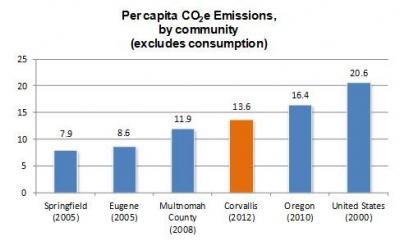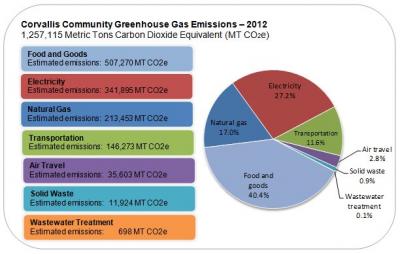2012 Community Greenhouse Inventory Report
In order to provide information for the community’s efforts to better understand its climate impact, the City of Corvallis conducted a Community Greenhouse Gas Inventory for Corvallis, Oregon for the 2012 calendar year. The 2012 Community Greenhouse Gas Inventory Report (PDF) provides a summary of key findings and details about each category of emissions sources and activities.
The inventory was completed under the U.S. Community Protocol for Accounting and Reporting of Greenhouse Gas Emissions, a methodology developed by ICLEI – Local Governments for Sustainability and released in October, 2012. Emissions sources included in the inventory cover the broad categories of stationary emissions, electricity, transportation, solid waste, and the emissions associated with household and government consumption of food, goods and services. This inventory should serve as a baseline for future inventories and to track the community’s impact.
The inventory, as part of the Energize Corvallis programs, was supported in part by a three-year Climate Showcase Communities grant awarded in 2011 by the Environmental Protection Agency.
Total Emissions
Total emissions in 2012 for the Corvallis community are estimated at 1,257,115 Metric Tons Carbon Dioxide Equivalent (MT CO2e). The chart below summarizes the findings based on the five Basic Emissions Generating Activities plus Household and Government Consumption.

Comparison of Emissions
The chart on the right shows per capita GHG emissions, excluding consumption associated emissions, for several locations. It is important to note the different time periods covered and that some broad assumptions had to be made for this comparison (e.g. the inclusion of air travel or whether transportation models have the same assumptions around the types of travel included). For context, U.S. greenhouse gas emissions slowly increased until 2007 then declined to the point where 2012 emissions were roughly equal to 1994 levels.
Methodology
In order to quantify GHG emissions in a way that is useful to local government and the community, it is important to use a standardized approach. This inventory uses the approach and methods provided by the U.S. Community Protocol for Accounting and Reporting Greenhouse Gas Emissions (Protocol), released by ICLEI – Local Governments for Sustainability in October, 2012.
The Protocol establishes reporting requirements for all community GHG emissions inventories, provides detailed accounting guidance for quantifying GHG emissions associated with a range of emission sources and community activities, and provides a number of optional reporting frameworks.
This Protocol is the national standard for U.S. local governments to account for and report on greenhouse gas emissions associated with their communities. Use of the Protocol provides an accepted methodology to estimate and report on GHG emissions associated with the community. This allows for more informed decisions about how and where to pursue GHG emissions reduction opportunities.
This Protocol requires inclusion of five Basic Emissions Generating Activities in their GHG emissions inventories:
- Use of electricity by the community
- Use of fuel in residential and commercial stationary combustion equipment
- On-road passenger and freight vehicle travel
- Use of energy in potable water treatment and distribution and wastewater collection and treatment
- Generation of solid waste by the community
In addition to these five Basic Emissions Generating Activities, this inventory also estimates the emissions associated with the manufacturing and production of food, goods, and services consumed by Corvallis households and local government. Consumption generates emissions all over the world from activities such as mining, manufacturing, and transportation. This inventory estimates the worldwide emissions associated with consumption by Corvallis households and government.
For More Information
The full report (PDF) contains more information on the community’s greenhouse gas emissions. Additional questions can be directed to the City of Corvallis Sustainability Program Specialist, Scott Dybvad, at (541) 766-6331 or via email.
